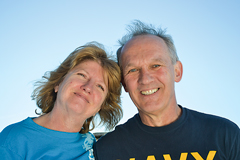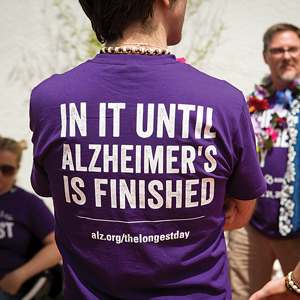Barbara Cole is a wife and mother, a career woman with a master’s degree in business, an overachiever, and a self-proclaimed optimist.
“Some have called me a force of nature,” Cole explains. “I’ve never met an obstacle I could not get around, overcome, or
power through!”
In 2010, at 53, Cole was diagnosed with early onset Alzheimer’s disease, one of approximately 200,000 people nationwide with early onset. Alzheimer’s, the nation’s sixth leading cause of death, affects more than 5 million Americans, including 130,000 Virginians.
When early onset Alzheimer’s disease strikes, many are in their forties and fifties in that precious segment of the personal timeline dedicated to raising families and career advancement.
Cole said she noticed subtle changes. “It seemed that routine tasks were taking longer to complete, like balancing the checkbook, and I would make frequent mistakes, forcing me to double and triple check just to make sure there were no errors.”
One of the most common signs of Alzheimer’s is memory loss, especially forgetting recently learned information. Others include forgetting important dates or events; asking for the same information over and over; increasingly needing to rely on memory aids or family members for things individuals used to handle on their own.
“I was having trouble remembering things,” Cole adds. “Things that had been committed to memory, such as my Social Security number, how old I was, or the year my father died.”
According to Sherry Peterson, CEO of the Alzheimer’s Association Greater Richmond Chapter, there are many possibilities that could account for the kinds of memory issues Cole experienced, notably, a stroke, a brain tumor, thyroid problems, Parkinson’s, menopause, stress or depression, or something as benign as a vitamin deficiency. And since health care providers generally do not look for Alzheimer’s disease in younger people, getting an accurate diagnosis of early onset Alzheimer’s can be a long and frustrating process.
“I honestly thought it would be easier to go through the rest of my life without knowing if what I was experiencing was Alzheimer’s,” said Cole.

An MRI and brain scan, however, showed that Cole’s left temporal and parietal lobes were not lighting up as they should (a neurology term) and she was told that she had some form of dementia, probably Alzheimer’s.
“I was sure it could not be Alzheimer’s disease,” Cole explains. “I was too young. I could not imagine a more horrible journey for my husband, Rich, and our two daughters – a disease with no cure, no real treatment – and a disease with a dreadful progression into the eventual loss of memories, and with that, myself.”
When she could no longer perform all the duties of her job, Cole lost her employment, what she says was a big part of her identity.
Cole, like many receiving a diagnosis, at first debated sharing the information with her extended family and friends.
“Finally, I decided that hiding it, because of stigma and shame, served no worthwhile purpose and it was a heavy burden to carry alone.”
She was not prepared for their reactions.
“Some simply refused to believe there was anything wrong with me. I was too young. I was functioning. I knew their names. I just didn’t fit their stereotype of a person with Alzheimer’s, which put me in the position of having to defend the diagnosis and to convince them the symptoms I was having were real.”
Cole said her emotional pain was overwhelming. “The idea of putting my daughters and husband through the ordeal of watching as I lose my memories of them, and to become a burden to them was nearly too much to bear.”
Through her isolation and sadness, she sought help and found the Alzheimer’s Association.
Sherry Peterson says the Alzheimer’s Association exists to help people like Barbara and her famly. Its broader mission is to eliminate Alzheimer’s disease through the advancement of research; to provide and enhance care and support for all affected; and to reduce the risk of dementia through the promotion of brain health.
“Barb Cole is proof that people living with Alzheimer’s and related dementias can still live meaningful lives,” Peterson said.
Last year, the Greater Richmond Chapter of the Alzheimer’s Association assisted more than 11,500 neighbors and answered over 2,100 helpline calls from individuals seeking information and resources, wanting tips for caregiving, or just needing someone to listen.
Barbara Cole is now one of those resources.
“I’ve decided to make something positive come out of my Alzheimer’s journey and to use my strength to make a difference,” Cole said. “I am fully committed to using every bit of my energy to educate the public about Alzheimer’s, to dispel the myths and misconceptions, to advocate for increased funding and research, and to end the stigma associated with the disease.”




